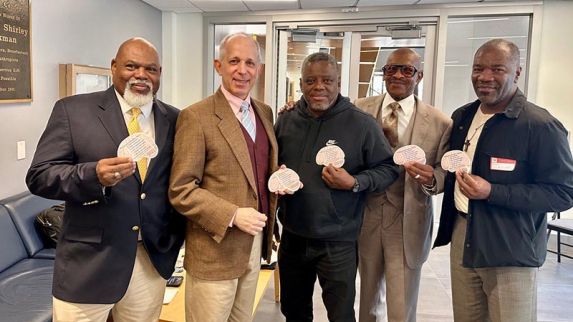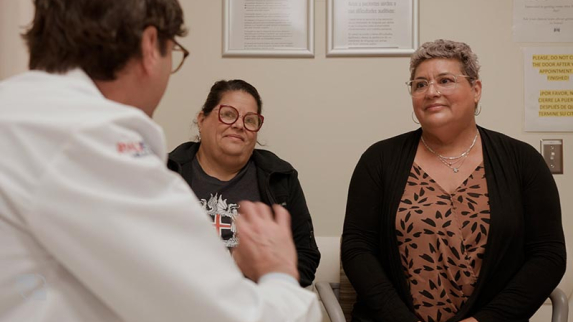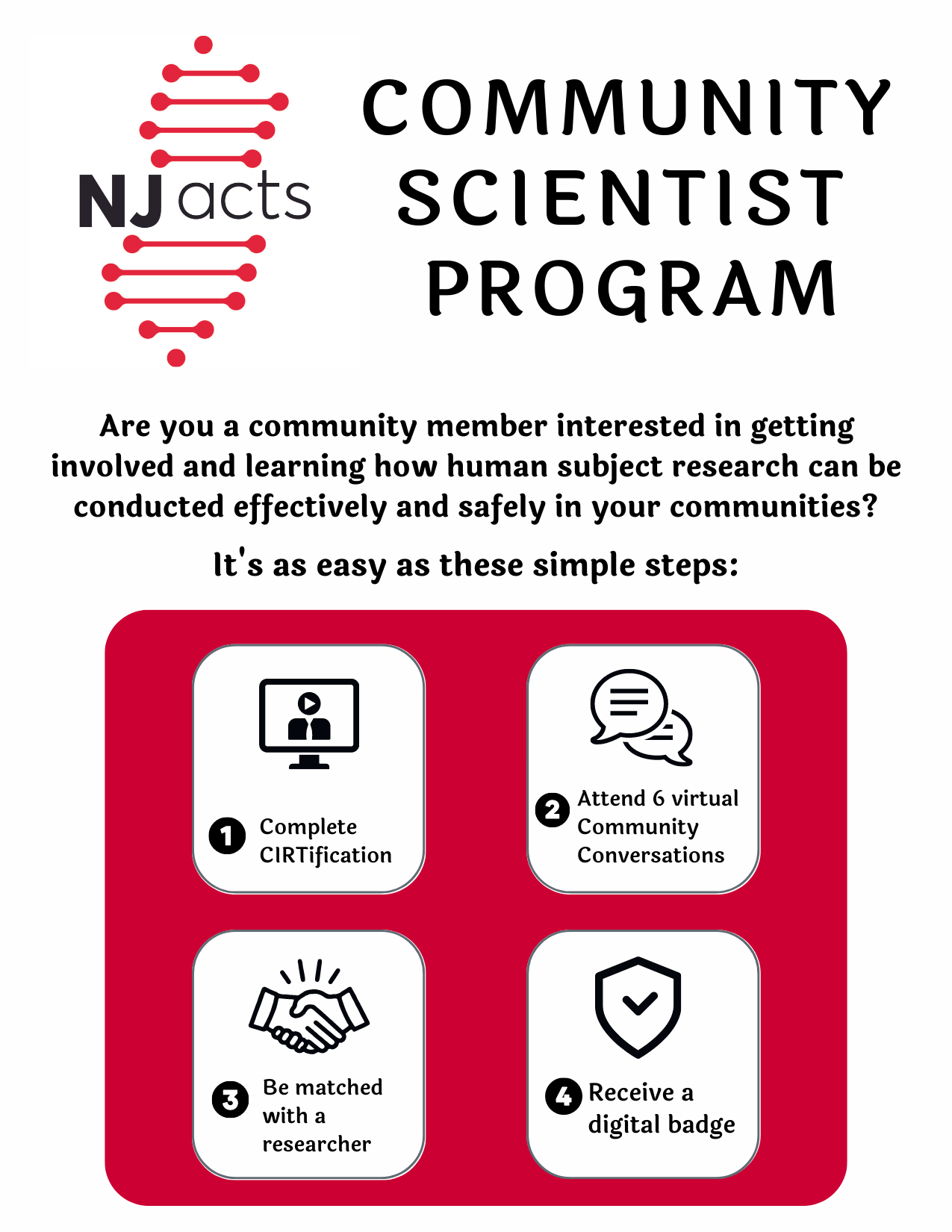180+ networks across 21 NJ counties
COMMUNITY ENGAGEMENT CORE OVERVIEW
NJACTS draws leading academic, industry and community groups together to understand and address the health needs of New Jersey. Central to this is engagement with our community to ensure that our efforts respond to their priorities. Our goal is to conduct research with the New Jersey community, in the community and for the community, and yet, have impact beyond our state’s boundaries.
Stay in Touch!
Join RCommunity!
Join Rutgers Health Service Corps!
Empowering Community-Based Research
Through Cultural and Linguistic Collaboration
- Navigating interpreter-mediated encounters
- Effective translation for research
- Understanding cultural nuances in literacy, trust, and belonging
Through collaboration across disciplines and leveraging expertise within and beyond Rutgers, CrEER ensures that research is inclusive, culturally relevant, and impactful both locally and globally.
👉 Discover how CrEER is shaping the future of community-based research here.
Association for Clinical and Translational Science (ATCS) Membership for Community Members
Did you know that community members are eligible to become members of ACTS through their affiliation with NJ ACTS?
Community members are able to access ACTS’ member benefits, including:
- Discounted registration to the annual Translational Science meeting
- Opportunities to participate in Special Interest Groups and Committees
- Access to the community platform website and more!
Resource for Investigators – CTSA Compendium of D&I Catalogs
Dissemination and implementation (D&I) research focuses on translating evidence-based interventions into real-world settings to improve health outcomes in the broader community.
An open-source CTSA Compendium of D&I Catalogs has been developed by the Clinical & Translational Science Awards (CTSA) Program’s “Advancing Dissemination and Implementation Sciences in CTSAs” working group to support investigators at any stage of their D&I skill-building journey. It provides a curated list of resource catalogs relevant to the conduct of D&I science. The materials include frameworks/theories/models, methods/measures, funding resources, practice resources, training, and health equity resources. Click here to learn more.
CIRTification – A New Alternative to CITI for Community Partners
The rollout of CIRTification at Rutgers has begun. The CIRTification program provides research ethics training alternatives for individuals in community organizations, with limited understanding of conducting human research and protecting potential research participants. This option provides training focused on equipping community partners to conduct human subject research effectively and safely in their communities.
To learn more about the program at Rutgers, please visit this link CIRTification.
NJ ACTS COMMUNITY SCIENTIST PROGRAM
This program is designed to provide researchers with rapid feedback from expert community members to ensure their research projects are culturally appropriate and relevant to the community.
PARTICIPATE IN OUR NEXT COHORT!
For more information, please contact njactscommunity@rwjms.rutgers.edu
NJ HEROES TOO
Through the ongoing New Jersey Healthcare Essential Worker Outreach and Education Study – Testing Overlooked Occupations (NJ HEROES TOO), we have gained a wealth of data on COVID-19’s effects, gleaned valuable learnings on attitudes toward testing and vaccines, and improved COVID-19 awareness in underserved communities.

Community Blog

Report Finds Broad Adoption of AI in New Jersey – and Strong Support for Regulation.
Most New Jersey residents now use artificial intelligence (AI) tools in school, at work or in daily life, but remain concerned about the technology’s broader societal impact, particularly on employment and high-stakes decision-making by law enforcement, hospitals,...

Knowing Your Family’s Surgical History Might Be Key to Preventing Emergency Gallbladder Surgery.
People might attribute midnight bouts of chest pain or waves of nausea to food poisoning, stress or a stubborn case of indigestion, but Rutgers Health researchers suggest that knowing your family’s surgical past could pinpoint another cause: gallstone...

Professor’s Research Opens Up New Possibilities for Treating a Painful Gastrointestinal Disease.
A Rutgers scientist whose research is opening up new possibilities for treating Inflammatory Bowel Disease (IBD) has received the 2025 Grossman Innovation Prize from the School of Arts and Sciences. The prize, which provides financial support to faculty members...

Rutgers-Newark Searches for New Ways to Enroll Men in Alzheimer’s Studies.
What's the secret to getting men to participate in medical research? Rodney Barnard, 77, is one of the local community members helping Rutgers University–Newark recruit men to join a study of risk and resilience to Alzheimer's disease in African Americans. He’s...

Clinical trial in N.J. gives patients with incurable cancer a new chance at life.
Cancer came crashing into Maria Pascale’s life like a high-speed car — literally. During a CT scan after a traumatic car accident in February 2018, Pascale was dealt another blow when doctors noticed a mass in her neck, in between the esophagus and thyroid gland. A...

Entrepreneurship Lessons Coming to Introductory Engineering Courses.
Entrepreneurship lessons are being added to introductory engineering courses at New Jersey Institute of Technology in 2026, where students will be motivated to learn front-end product research and digital drafting by designing their own products. The adjustment is the...


